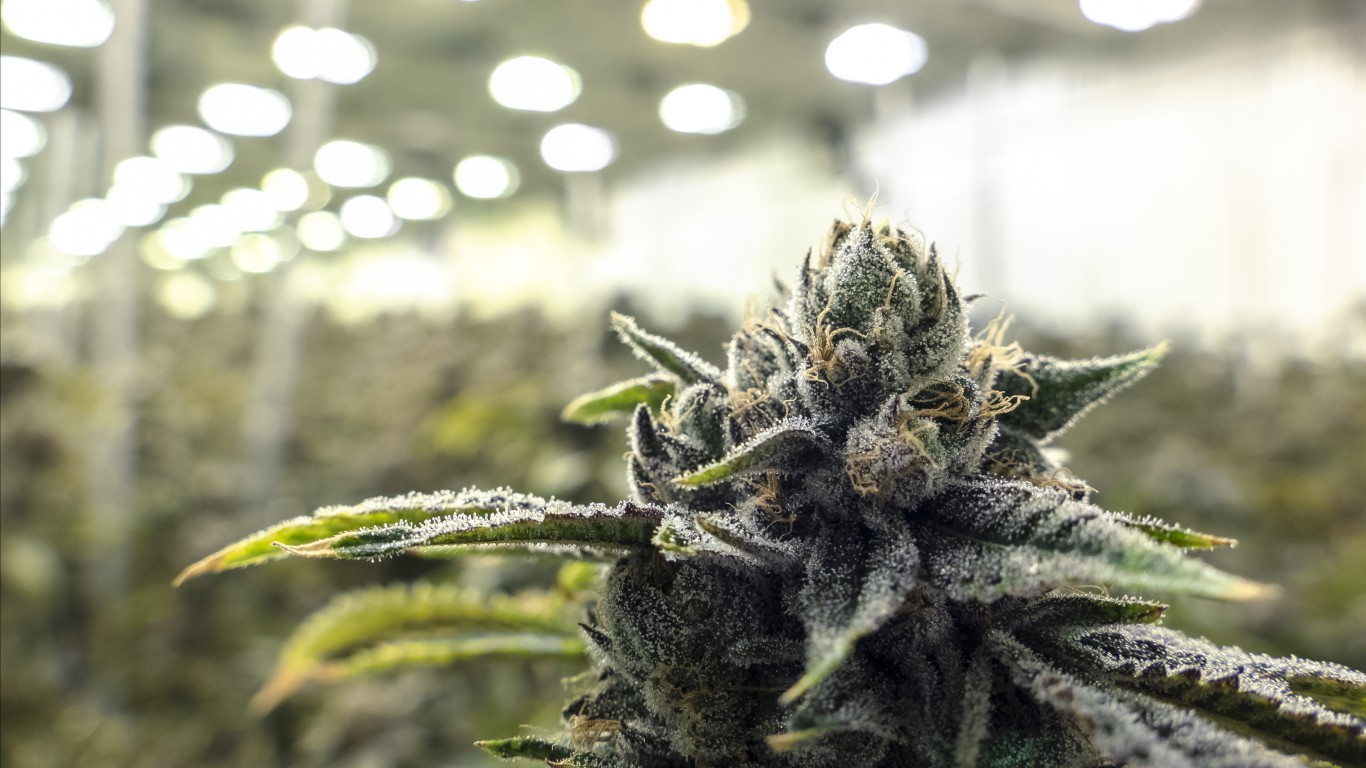
It’s a little awkward talking about cannabis companies after a horrible, bad, not-very-good year like 2019. The industry’s largest exchange-traded fund, the ETFMG Alternative Harvest ETF (NYSEARCA: MJ), ended the year down nearly 29%. A few cannabis stocks did better but most did worse. Organigram Holdings Inc. (NASDAQ: OGI) was one of them.
Organigram, which began as a medical cannabis provider in 2013, is a good example of the pot market’s troubles last year. The company produces indoor-grown cannabis for patients and adult recreational consumers in Canada, and it is developing international business partnerships to extend its global footprint.
At the end of its 2018 fiscal year (November 2018), the company had a market cap of $546.1 million. Six months later the market cap had more than doubled to $1.12 billion. By the end of its first fiscal quarter of 2020 (November 2019), Organigram’s market cap was $417.6 million.
Like virtually every other marijuana producer, Organigram felt a lot of Wall Street love in the second half of 2018 and the first quarter or so of 2019. Then, what the stock market had given, it decided to take back.
The Boom Goes Bust
Beginning in late 2018, billions of investment dollars poured in from some beverage and tobacco giants. Constellation Brands Inc. (NYSE: STZ) took a $4 billion stake in Canopy Growth Corp. (NYSE: CGC) and Altria Inc. (NYSE: MO) invested $1.8 billion in Cronos Group Inc. (NASDAQ: CRON). Canopy Growth and Cronos were among the 10 largest marijuana companies as 2019 began. Molson Coors Co. (NYSE: TAP) also signed a joint venture deal with Hexo Corp. (NYSE: HEXO) to develop pot-infused beverages.
These big investments by established consumer products companies dried up in 2019. Only the $2.9 billion merger between Tilray Inc. (NYSE: TLRY) and its majority shareholder, Privateer Holdings, came anywhere near the big transactions of 2018. According to Viridian Capital Advisors, for the full year, companies trading marijuana stocks on public exchanges raised $7.64 billion in fresh capital, of which some $5.28 billion came in the form of new equity. In 2018, publicly traded pot companies raised $9.9 billion in new capital, including $7.9 billion in new equity.
Cannabis sales improved last year, but not by as much as analysts and investors were looking for. Organigram, for instance, saw net revenues rise from $16.9 million in the first quarter of fiscal 2019 (ended in November 2018) to $70.1 million in the same fiscal quarter of 2020. Adjusted EBITDA, however, fell from $66.7 million to a negative $22.1 million over the same period.
On the balance sheet, the company reported cash and short-term investments of $72.2 million at the end of November 2018 and $25.7 million at the end of this past November.
Still, Organigram’s share price dropped by just over 31% in 2019, while the S&P 500 added almost 29%. Using the Alternative Harvest ETF as a benchmark, Organigram posted a yearly decline just a bit more than average. That was better than Hexo (down 53.6%), Aurora Cannabis (down 56.5%) or Tilray (down 75.7%).
2019 Was High on Promise, Low on Delivery
Regulating the new cannabis industry took longer than expected. Legal sales of recreational pot in Canada did not begin until the fall of 2018, even though legislation approving sales was passed almost 18 months earlier.
In Ontario, Canada’s highest population province, only about two dozen retail stores were open a full year after sales began. In December, the provincial government replaced its lottery system for awarding licenses.
Health Canada also failed to move quickly to license derivative products like edibles, vapes, infused beverages, topicals, tinctures and concentrates. These high-margin products were not available until mid-October of 2019. The sale of derivatives was expected to boost revenues and profits and to keep investors buying stock in Canada’s cannabis companies.
Organigram was unable to ship its first vaporizing pen until mid-December, too late to have any impact on first-quarter results. And what the company calls its Rec 2.0 portfolio of vape and edible products face delays or other restrictions in several provinces, including Quebec, Newfoundland and Labrador, and Alberta.
How 2020 Will Be Different
To overcome the hurdles Organigram and other Canadian cannabis firms face going into 2020, at least two things are going to be needed: cash and a solid plan. Organigram spent heavily during its 2019 fiscal year but still managed to close with more than $25 million in cash on the books, along with some $55 million in available credit. That should go a long way toward promoting the new products.
The company also plans to delay the completion of the last phase of its $12 million facility expansion to raise its production capacity to nearly 250,000 pounds. In its latest earnings report, Organigram noted that “remaining construction can be completed in a relatively short timeframe to be ready to respond to an increase in consumer demand which may result from additional store openings.”
Those new stores are planned in the country’s largest markets (Ontario and Quebec), collectively representing over 60% of the Canadian population. The focus on high-margin derivative products gets a boost from Organigram’s development of a proprietary technology expected to provide an initial absorption of cannabinoids within 10 to 15 minutes. In dissolvable powder form, consumers can add the powder to their own beverage of choice. Organigram plans to have the powder on the market by the summer.
One last note about Organigram’s balance sheet. Unlike some competitors, the company did not go into acquisition mode last year. Among those that did, some have taken write-offs. Virtually all have seen their goodwill increase as the actual value of the new assets has been adjusted to reflect last year’s reality. Tilray posted goodwill of $163 million in its most recent quarterly report. Aphria Inc. (NYSE: APHA) claims $504 million of goodwill, and Aurora lists nearly $2.4 billion in goodwill. Organigram, however, claims no goodwill
Organigram appears to want to differentiate itself from other Canadian producers by focusing on its derivative products like vapes, pens, edibles and, now, dissolvable powder. Going after high-margin markets is often a good, if costly, strategy. Organigram stock has massive upside potential; now the company needs to execute.
In 20 Years, I Haven’t Seen A Cash Back Card This Good
After two decades of reviewing financial products I haven’t seen anything like this. Credit card companies are at war, handing out free rewards and benefits to win the best customers.
A good cash back card can be worth thousands of dollars a year in free money, not to mention other perks like travel, insurance, and access to fancy lounges.
Our top pick today pays up to 5% cash back, a $200 bonus on top, and $0 annual fee. Click here to apply before they stop offering rewards this generous.
Flywheel Publishing has partnered with CardRatings for our coverage of credit card products. Flywheel Publishing and CardRatings may receive a commission from card issuers.
Thank you for reading! Have some feedback for us?
Contact the 24/7 Wall St. editorial team.
 24/7 Wall St.
24/7 Wall St.


